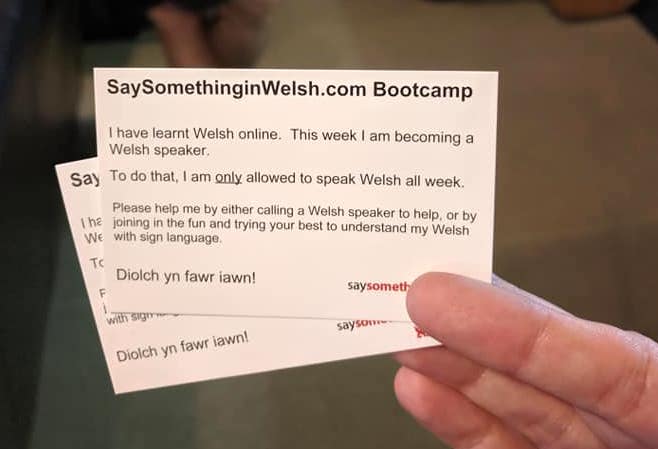One of the hardest things for Welsh learners is drumming up the confidence to persuade native speakers to speak to them in Welsh. Why? Because all people are naturally preconditioned to take the so-called “path of least resistance” in life. Just as it is easier to veg out in front of the television than to read a book, so it is easier to use English than to struggle through a stilted conversation in Welsh.
This tendency can be mostly clearly observed in groups of bilingual or multilingual children who, whilst interacting in an informal setting such as the playground, will automatically choose the strongest language of the group. No child will ever say, “Oh, let’s speak such-and-such language so that so-and-so can improve,” because quick and efficient communication takes priority, not the interests of one individual.
“Welcome to the human condition. We tend to do that which is easiest, often to the neglect of that which is best.” – Thomas Oppong
Adults are more capable of making effortful decisions that go against what feels natural or more comfortable, but like children, we tend to avoid unnecessary challenges such as speaking in broken Welsh to someone we know is perfectly bilingual. Likewise, fluent Welsh speakers will rarely initiate a conversation in Welsh with a learner for fear of making the learner uncomfortable, or simply because the mental effort is too great.
For communication between the Welsh speaker and learner to work, both parties must prioritise the learner’s needs above quick communication!
The good news is that there are many ways that you, as a learner, can encourage Welsh speakers to speak to you in Welsh, even if you’re still struggling with the basics and don’t have much experience using the language out in the wild. Let’s take a look at them now!
Start every conversation with “Dach chi’n siarad Cymraeg?”
I picked up this technique whilst taking part in the Say Something in Welsh Bootcamp in June this year. Wherever we went and whomever we spoke to, we had to start each conversation with the question “Dach chi’n siarad Cymraeg?” (Do you speak Welsh?). If the answer was “yes”, we would continue the conversation in Welsh. If the answer was “no”, we would hand them a business card with the following written upon it:
“I have learnt Welsh online. This week I am becoming a Welsh speaker. To do that, I am only allowed to speak Welsh all week. Please help me by either calling a Welsh speaker to help, or by joining in the fun and trying your best to understand my Welsh with sign language. Diolch yn fawr iawn!”

Although I no longer use the business cards, I’ve continued to employ this technique when I go shopping, and I’ve had quite a bit of luck so far in our local supermarket and pharmacy! It turns out that more people can speak Welsh in this area than I ever imagined, and are quite happy to converse with learners if you show enough enthusiasm and determination.
Chat with a fellow learner in a public place
Here’s another technique I discovered whilst at Bootcamp. One evening, when my fellow Bootcampers and I were sitting outside at a pub, drinking beer and chatting loudly in our broken Welsh, we were approached by three different Welsh speakers, all of whom congratulated us in Welsh on making the effort to speak the language. We sat and chatted with one of them for quite some time, and even ended up exchanging phone numbers!

To make sure this wasn’t a one-off, I tried this technique again after Bootcamp, this time with my dad who is also a learner, and lo and behold, the same thing happened again, this time with a lovely old lady who had been eavesdropping on our conversation.
Whoever said that speaking loudly in public was a nuisance has obviously never learned another language! 😉
Wear a shirt with Welsh words on it
A fellow learner from Italy brought this handy tip to my attention. One day, she was filling her car up with petrol when out of the blue, a curious Welshman from Aberystwyth approached her to ask if she was Welsh, all because she was wearing a Datblygu t-shirt. They ended up having a pleasant, albeit short conversation before they went their separate ways.
Now, I’m not suggesting that you fill your wardrobe with Welsh t-shirts, but it’s probably a good idea to own one or two to wear at Welsh events such as the Eisteddfod. Doing so will definitely increase your chances of meeting Welsh speakers!
Post in Welsh on social media
If you want to draw attention to the fact that you are learning Welsh and wish to practise without directly coming out and saying so, I’ve found that it really helps to post in Welsh on social media so that your Welsh-speaking friends and family can see you are making the effort.
And if you don’t have any friends or family who speak Welsh, it doesn’t matter – the beauty of social media is that you can even chat with people you don’t know! Geordan Burress, for example, has managed to improved her Welsh by leaps and bounds by holding short conversations with people on Twitter, even though she lives in Ohio, USA. She now has dozens of Welsh speaking followers with whom she frequently practises her conversation skills.
Just say you want to speak in Welsh
Sometimes the best tactic is the most direct one! When you start speaking to someone and you find that they continually switch back to English, there is nothing wrong with politely saying that you’d prefer to speak in Welsh because you are learning and would like to improve. The worst thing that can happen is that the other person will refuse – usually because they aren’t confident enough in their own language skills – but my personal experience is that most people are happy to oblige once they recognise your desire to improve.
In what ways do you encourage people to speak to you in Welsh? I’d love to hear your ideas!


